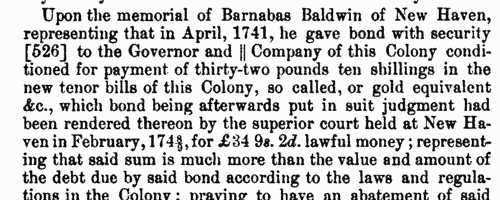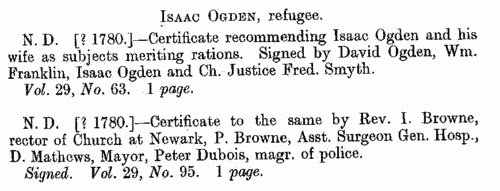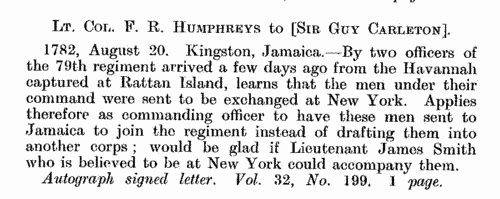Our indexes include entries for the spelling brush. In the period you have requested, we have the following 91 records (displaying 21 to 30):
 Masters and Apprentices
(1747) Masters and Apprentices
(1747)
Apprenticeship indentures and clerks' articles were subject to a 6d or 12d per pound stamp duty: the registers of the payments usually give the master's trade, address, and occupation, and the apprentice's father's name and address, as well as details of the date and length of the apprenticeship. | Sample scan, click to enlarge

|
 Masters of Apprentices
(1757) Masters of Apprentices
(1757)
Apprenticeship indentures and clerks' articles were subject to a 6d or 12d per pound stamp duty: the registers of the payments usually give the master's trade, address, and occupation, and the apprentice's name, as well as details of the date and length of the apprenticeship. 1 January to 31 December 1757. | Sample scan, click to enlarge

|
Tradesmen of York
(1559-1759)
No man or woman could trade in the city of York without having obtained 'freedom' of the city. Their names were recorded on the 'Freemen's Roll', or Register of the Freemen of the City of York, which contains about 16,600 names for this period. A list of names was prepared for each year. Each annual list starts with the name of the mayor and the camerarii or chamberlains. The chamberlains were freemen charged with the duty of receiving the fees of the new freemen; of seeing that only freemen traded in the city; and of preparing this roll, which was compiled from the names on their own account books from the receipts for the fees. There are three groups of freemen: those who obtained freedom after serving out an apprenticeship to a freeman; the children of freemen (per patres); and a handful who claimed freedom by 'redemption', i. e. by purchase or gift from the Mayor and Court of Aldermen.
| Sample scan, click to enlarge

|
Inhabitants of Connecticut
(1762-1767)
The minutes of the 'General Assembly of the Governor and Company of His Majesty's English Colony of Connecticut in New England in America' from page 447 to the end of volume IX, and pages 1 to 310 of volume X, transcribed and edoted by Charles J. Hoadly, State Librarian, were printed at Hartford in 1881. The record of each assembly commences with a list of officers, and of the representatives or deputies of the freemen of the several towns in the colony. There are then elections and appointments of officers for the ensuing year, including justices of the peace for each county; general enactments; and then the results of deliberations on private petitions. | Sample scan, click to enlarge

|
Gloucestershire Freeholders and Tenants: Rockhampton
(1776)
The election of a knight of the shire to represent the county of Gloucester in Parliament began 6 May and continued until 17 May 1776, the Hon. George Cranfield Berkeley and William Bromley Chester, esq., being the candidates. The franchise was for adult males possessing freehold worth 40s or more per annum. This poll book lists all voters, arranged by hundred and then by township according to the place where their freehold lay. The voter's full name is given (surname first); place of abode; of what the freehold consists (such as messuage and lands); in whose tenure; and how his vote was cast. | Sample scan, click to enlarge

|
Gloucestershire Freeholders and Tenants: Tewkesbury
(1776)
The election of a knight of the shire to represent the county of Gloucester in Parliament began 6 May and continued until 17 May 1776, the Hon. George Cranfield Berkeley and William Bromley Chester, esq., being the candidates. The franchise was for adult males possessing freehold worth 40s or more per annum. This poll book lists all voters, arranged by hundred and then by township according to the place where their freehold lay. The voter's full name is given (surname first); place of abode; of what the freehold consists (such as messuage and lands); in whose tenure; and how his vote was cast. | Sample scan, click to enlarge

|
Soldiers, administrators, refugees and merchants in America
(1767-1779)
These are the headquarters papers of sir William Howe and sir Henry Clinton, successive British commanders-in-chief during the American war of independence. Many of the individuals recorded were part of the British military administration, but others are refugees and merchants whose lives had been disrupted by the conflict. | Sample scan, click to enlarge

|
 Masters of clerks and apprentices
(1780) Masters of clerks and apprentices
(1780)
Apprenticeship indentures and clerks' articles were subject to a 6d or 12d per pound stamp duty: the registers of the payments usually give the master's trade, address, and occupation, and the apprentice's name, as well as details of the date and length of the apprenticeship. 3 January to 30 December 1780. IR 1/30 | Sample scan, click to enlarge

|
Soldiers, administrators, refugees and merchants in America
(1779-1782)
These are the headquarters papers of sir Henry Clinton, British commander-in-chief during the American war of independence. Many of the individuals recorded were part of the British military administration, but others are refugees and merchants whose lives had been disrupted by the conflict. These records are from August 1779 to June 1782. | Sample scan, click to enlarge

|
Soldiers, administrators, refugees and merchants in America
(1782-1783)
These are the headquarters papers of sir Guy Carleton, British commander-in-chief during the American war of independence. Many of the individuals recorded were part of the British military administration, but others are refugees and merchants whose lives had been disrupted by the conflict. These records cover July 1782 to March 1783. | Sample scan, click to enlarge

|
Research your ancestry, family history, genealogy and one-name study by direct access to original records and archives indexed by surname.












